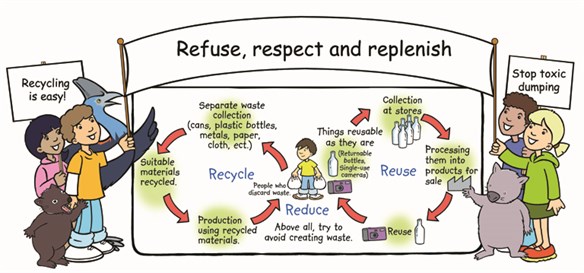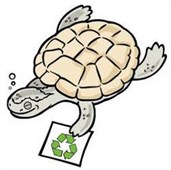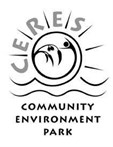Diary Chapters
The 6Rs (reduce, reuse, recycle, respect, replenish and refuse)
Wise Words
With over 22 million Australians, we make a lot of rubbish. If we all lived by the 6Rs it would make a big difference.
WHAT IS YOUR FAVOURITE
R?

REDUCE, REUSE, RECYCLE, RESPECT, REPLENISH AND
REFUSE
Download our 6
R's checklist to track your environmental impact!
HOW MUCH OF WHAT YOU BUY ENDS UP IN THE BIN BEFORE AN
HOUR IS UP?
Could these items be repaired to make them last a little longer?
Maybe some things could be reused or recycled and made into
something else? What about the packaging - love it or leave it?
Rethinking the way we use resources can help to reduce landfill,
cut back on greenhouse gas emissions, ease the pressure on our
natural environment and save us money! Be on the lookout for
special tricks, such as advertising, that hook you in to 'needing'
more stuff.
Find out how you can help your school reduce its waste with the
help of SCRAP Ltd, a professional business
that gives the best advice on the 6Rs you can find!
POWER FOOD FOR WORMS
One of the easiest ways to reduce landfill is to build a compost
and worm farm. Food scraps and other plant-based materials such as
paper and cardboard can be used to feed the worms. They will break
it down to organic material that can be used as natural fertiliser
in the garden. Maybe you can help your school to compost its
organic waste? Watch this informative video to learn the basics so you
can get started!
LASTING A LIFETIME?
When shopping with mum or dad to buy something new, look for
good quality stuff that's built to last. Buy products with a
warranty to make repairing or replacing them easy and cheap.
Sometimes it's cheaper for companies to give us a brand new item
because the cost of repair is too expensive. Sometimes companies
also sell products that are not built to last, but only work until
the next model is released - they call this whacky idea "planned
obsolescence". Always think before you buy and look after your
things to make them last for the long haul.
We use around 300 plastic bags a year. They can end up in
waterways and kill marine life. Start a campaign to reduce this
number. Make funky fabric bags and sell them at school.
The average family throws out 13,000 pieces of paper annually.
How much of that is junk mail? Show your family Jack Johnson's song about the Rs
to help them learn recycle!
Kathleen, NSW
One of our 2012 Green Lane Heroes, Kathleen, faced her fears by
starting a worm farm despite not liking the squirmy
creatures. After learning all about the problems by reading
the diary and watching documentaries, Kathleen wanted to teach
others what they could do to help. She approached her neighbours
and friends to give them suggestions for living a greener
life. Transforming rubbish into something amazing is another
of her passions. Who knew that a Pringles can makes a
beautiful kaleidoscope! What can you upcycle?
Maybe your school can start composting! Here are some instructions on how
to make compost in a bottle so you can get started!
- Contact your local council or community garden network. Invite
a representative to talk to your class about how to set up a
compost bin or worm farm in your school.
- You can use the fantastic Compost
Kids website to help you find all the information you
need to prepare your presentation!

RECYCLING RULES
Most paper and plastic packaging can be recycled in the recycling
bin. But landfill sites are piled high with items that could have
been recycled. Zero Waste South Australia is one of the world's
leaders in recycling. Other states and territories around Australia
are starting to follow in their footsteps. South Australians
receive a 10 cents refund when they recycle things at collection
depots. Around Australia we have systems for recycling chemicals,
oil, batteries and even old X-Rays!
Wouldn't it be nice to know how much other countries
recycle? Don't wonder any longer by checking out the Australian Conservation Foundation's
consumption Atlas!
PLASTIC BAGS
Every year Australians consume more than 4 billion supermarket
plastic bags! And we only recycle 3 per cent - the rest end us as
rubbish in our environment or in landfill.
Plastic Soup is a really clever short film
about plastic waste pollution. The music for the film was made
entirely from recycled plastic waste products - how clever!
Instruments were made from items in the rubbish/recycle bin, like a
drumkit made from a used roll of tape and percussion
instruments made from forks, lids, containers and of
course, plastic bags.
Plastic Soup is the story of the relationship between a man and
a plastic bag that stalks him through the suburban streets of
Bondi, Australia. The man is blind to the plastic pollution in his
environment and so the bag chases him to be noticed; to challenge
the man to acknowledge it.
Watch the
Plastic Soup video!
CLEAN UP THE WORLD
More than 20 years ago, Australian yachtsman Ian Kiernan
organised the first of many 'Clean Up Australia' days. 40,000
volunteers joined him in Sydney Harbour. Since then, the numbers
have grown into the millions and spread across the entire globe.
'Clean Up the World' is not only about picking up rubbish. It's
about repairing the damage our rubbish has caused and protecting
our natural environment for future generations.
This year Green Cross Australia received funding from through
the Everyone's Environment Grant, to run the
Green Lane Clean Up, which you may have been a part of !
Students from Caboolture all the way up to the Torres Strait have
been taking part in the Clean Up and picking up 100s and 100s of
kilograms of rubbish! Check out some of the pictures below!
Stuff to Check Out
THE STORY OF STUFF
What do we really need?
Of course we love stuff and some of it is necessary
for our survival. But we're making a lot of stuff we
don't really need. Making stuff uses up natural and
processed materials, energy, money and creates
pollution.
Then it needs to be transported to the
shops and often we only use it for a little while
before throwing it away. It's a good time to ask: how
much stuff do we really need? How can we make
stuff we love but doesn't damage our Earth?
Watch the story
about stuff video!
WHERE DO WE LIVE?
To do the following experiment, use an apple to represent
our planet:
- With help from a parent or teacher, cut your apple into
quarters.
- Eat 3 pieces. These pieces represent the oceans, 75% of our
planet's surface area.
- Cut the final piece in half and eat one half. It represents the
deserts we can't live in.
- You have one eighth of the apple left - cut it into four pieces
and eat three of them. These pieces represent the mountains and
poles of the Earth where it's too cold, too rocky or too steep to
grow food.
- Peel off the skin of the last piece, keep it and eat the rest.
This TINY piece of skin represents the area of land with soil that
is healthy enough to grow food for our entire population.
We need to be careful and
clever with our resources!
BEST FRIENDS FOREVER
Ever heard of Aquaponics? It's where fish and
plants are grown together... well, in two different, but connected
containers. The water with fish poo in it is used as fertilizer for
the plants, reducing the need for chemical nutrients. The plant
soil acts like a filter and keeps the fishes' water fresh and
clean.

THINK OUTSIDE THE SQUARE
Thinking outside the square about different ways to use the land
and our resources is fun! The Centre for Education and
Research in Environmental Strategies (CERES) built a
community centre on an old rubbish tip in Victoria. Together with
local volunteers, the people at CERES converted the local tip to an
'eco-oasis' for the local community. Check out this video to learn more about
what CERES offers local community!
|

HANDS ON! Sometimes it can be a
little tricky to know what is waste, organic and recyclable...
We don't want to put things into the wrong bin because then we
risk sending things to landfill.
Try out 'Ollies Super Hero Sorting Game'
to improve your sorting skills!!
|
RESPECT AND REPLENISH
Many things that we need come from our natural environment.
Paper is made from trees and glass is made from sand. We need
to respect everything we use and replenish what we take. Planting
more trees in forestry, creating marine reserves to prevent
over-fishing and using only what we need are ways of doing this.
Which of the 6Rs is the easiest to do? Which one do you need to
work at improving?